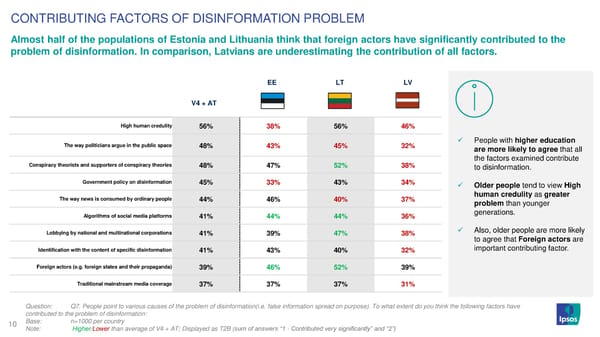CONTRIBUTING FACTORS OF DISINFORMATION PROBLEM Almost half of the populations of Estonia and Lithuania think that foreign actors have significantly contributed to the problem of disinformation. In comparison, Latvians are underestimating the contribution of all factors. EE LT LV V4 + AT Highhumancredulity 56% 38% 56% 46% The way politicians argue in the public space 48% 43% 45% 32% ✓ People with higher education are more likely to agree that all the factors examined contribute Conspiracy theorists and supporters of conspiracy theories 48% 47% 52% 38% to disinformation. Government policy on disinformation 45% 33% 43% 34% ✓ Older people tend to view High The way news is consumed by ordinary people 44% 46% 40% 37% human credulity as greater problemthan younger Algorithms of social media platforms 41% 44% 44% 36% generations. Lobbying by national and multinational corporations 41% 39% 47% 38% ✓ Also, older people are more likely to agree that Foreign actors are Identification with the content of specific disinformation 41% 43% 40% 32% important contributing factor. Foreign actors (e.g. foreign states and their propaganda) 39% 46% 52% 39% Traditional mainstream media coverage 37% 37% 37% 31% Question: Q7. People point to various causes of the problem of disinformation(i.e. false information spread on purpose). To what extent do you think the following factors have contributed to the problem of disinformation: Base: n=1000 per country 10 Note: Higher/Lower than average of V4 + AT; Displayed as T2B (sum of answers “1 - Contributed very significantly” and “2”)
 Perceptions of information chaos in Baltic states and Central Europe Page 9 Page 11
Perceptions of information chaos in Baltic states and Central Europe Page 9 Page 11